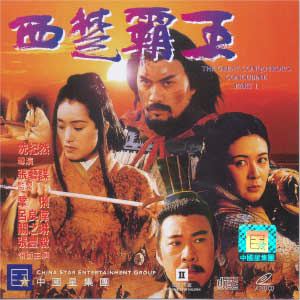The Great Conqueror's Concubine

Reviewed by YTSL
From what I had read about it, this 1994 Hong
Kong-Mainland Chinese collaborative effort possessed similar ambitions and
faults as the Chen Kaige directed "The Emperor and the Assassin" which I
had viewed - and was disappointed by - a few months ago. Although the
idea of a(nother) three hour long early imperial historic epic did not immediately
majorly appeal, I eventually couldn't resist checking out the "cast of thousands"
- at least in terms of number of undoubtedly cheap extras -- Zhang Yimou
executive produced work which stars two Hong Kongers who I feel don't get
as many plum roles as they deserve (Rosamund Kwan and Ray Liu) alongside
Mainland Chinese megastars, Zhang Fengyi and Gong Li.

In THE GREAT CONQUEROR'S CONCUBINE, Ray Liu portrays a general named Xiang
Yu whose military exploits and successes earned him the sobriquet of "The
Western Conqueror" while Rosamund Kwan is his beloved Lady Yu Gei.
Though she spends the bulk - if not all -- of the film as Zhang Fengyi's
rival general Liu Bang's not particularly liked - by him and many others
-- wife, it becomes clear some time before this turbulent drama's end that
the movie's title character is that played by Gong Li. Even while the
production contains numerous differently but always grandly staged battles
between often intimidatingly large rival armies of men (including that of
the then ruling - from 221 to 206 B.C. -- Qin dynasty) as well as martial
displays by scary weaponed individuals, the most bone chilling and cunning
maneuvers are those enacted by Gong Li's conniving Lady Liu Jeung (who makes
Gong Li's "The Emperor and the Assassin" character look like a naïve
idiot and Rosamund Kwan's Lady Yu Gei an impossibly sweet saint).

THE GREAT CONQUEROR'S CONCUBINE is one of those films that I can well imagine
bringing about a sense of sensory overload in its viewers. This is
due to its being so that apart from its being a rather lengthy work, those
behind its making have elected to cover -- fairly briefly yet in quite a
bit of detail -- a lot of episodes in the political as well as military campaigns
of two ambitious men (and one ambitious women) to bring down their land's
rulers and jockey for power plus territorial, material and other possessions
of their own. As such, it is my suggestion that this four -- rather
than the usual two -- VCD occupying saga be watched in installments rather
than in one go; since upon doing so, certain sections can be better distinguished
from others and appreciated more (Personal favorites include those that took
place in the surroundings of the sumptious imperial residence which a captured
Lady Yu Gei was taken to be yet another of the Qin emperor's playthings and
into whose dungeons she was thrown into after biting his ear...). Alternatively,
I think it safe to state that the two scenes in which Rosamund Kwan and Gong
Li share a bath are ones which will stand out for most people however they
choose to view this generally serious yet never pretentious offering (which
does contain some "only in Hong Kong movies" moments as well as certain "only
in Mainland China" vistas!).

As the work winds down to its inevitable - this is a pictorial retelling
of amply recorded historic events, after all - conclusion, its story and
events get more infused (than previously) with emotion. In particular,
the sections filled with song are the most alternately heart-warming and
-rending. The final confrontation is also something that moved this
(re)viewer (almost to tears). Interestingly, it additionally emphatically
reconfirmed that the moviemakers' sympathies are not with the man who ended
up founding the Han dynasty and the woman who, after his death, became China's
first empress in her own right (a profile of whom can be found on a "100
Celebrated Chinese Women" web site). For at least
comparative purposes, I'd like to point out that the feelings I had
for their - and others' -- victims is something which the more well known
- at least in the West - 1999 Chen Kaige vanity project (the director cast
himself as the father of the first emperor of China) never managed to evoke.

My rating for this film: 7.







